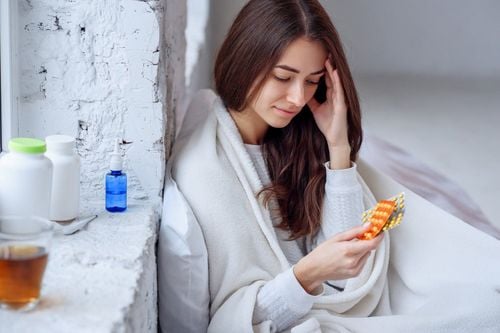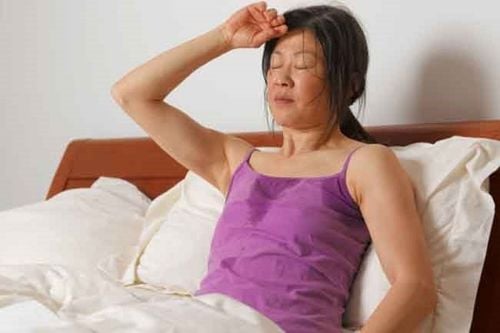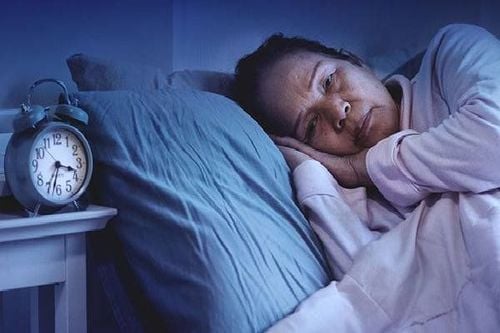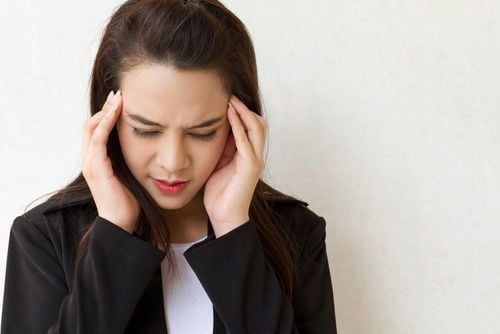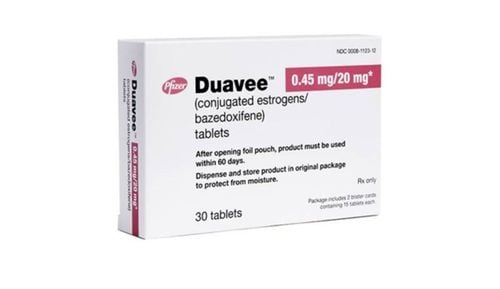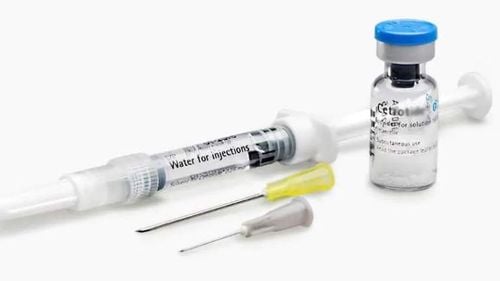This is an automatically translated article.
More than 80% of women going through menopause experience unpleasant symptoms, such as hot flashes, mood swings, irritability or trouble sleeping. Exercise and menopausal nutrition can help ease these symptoms effectively.
1. Signs of menopause
Menopause is the natural drop in reproductive hormones that accompanies the end of menstruation. It's a normal part of the aging process and usually occurs in the late 40s or early 50s in women.
It is difficult to pinpoint exactly when the hormonal changes associated with menopause begin. Usually, they are signaled by various symptoms, including:
Hot flashes; Difficulty sleeping; Vaginal dryness ; Night sweats; Mood swings; Athritis; Depression; Tired. If these symptoms start before your period stops, you may be in a transition period known as perimenopause. You may also find that your period is lighter or shorter, and may come more or less than usual. 12 months without a period is a more obvious sign of menopause.
2. Nutritional needs during menopause
In terms of menopausal nutrition, you'll want to focus on foods that help keep your heart healthy, bones strong, and brain sharp, while reducing your intake of foods that cause difficult symptoms. your bear. Natural foods like fruits, vegetables, and whole grains can be especially helpful.
While the right diet won't eliminate your symptoms, it can help you feel better and reduce everyday side effects.
2.1. Maintaining Muscle Mass Sarcopenia, or gradual loss of muscle mass, usually occurs as your body ages. In fact, the loss of 3–8% of muscle mass per decade is thought to begin in a person's 30s. As you age, this ratio becomes significant because loss of muscle mass increases the risk of fractures and falls.
However, eating 25–30 grams of protein at each meal may protect you against this loss of lean muscle mass. A 3-ounce (85-gram) serving of salmon contains 22 grams of protein.
Other high-quality sources of protein include eggs, beef, seafood, and poultry like chicken or turkey. Plant-based foods, such as nuts, some meat substitutes, soy products such as tofu and other legumes can also contribute to daily protein requirements.
Eating foods high in leucine, a building block of protein may also optimize muscle building and maintenance in older adults. Most protein sources contain leucine. Animal products and some plant proteins, such as soy, are particularly good sources.
2.2. Preserve bone and brain health Osteoporosis is a decrease in bone mass, which is more common in older adults. If left untreated, it can lead to osteoporosis, which is a spongy condition in the bones that makes you especially susceptible to breaking or breaking a bone suddenly.
Foods rich in calcium and vitamin D help keep bones strong, which is important during menopause, especially since osteoporosis often occurs just before, during, and after menopause due to decreased levels of the hormone estrogen.
So you should aim to get 3 or more servings per day of fortified dairy products like yogurt, raw milk or cheese. Other foods that are naturally rich in vitamin D include seafood, egg yolks, and some mushrooms.
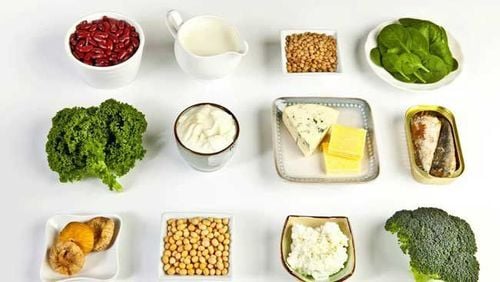
Dinh dưỡng thời kỳ mãn kinh cho phụ nữ cần bổ sung thực phẩm giàu canxi
2.3. Identify what's causing your hot flashes Some people experience more hot flashes when they eat spicy foods, drink alcohol and caffeine. As such, one strategy the next time you have a hot flash is to jot down what you last ate.
Doing so can help you identify trigger foods that you should limit or avoid to reduce how often or how intense you have hot flashes. Keeping a full food diary can be helpful in many other situations as well.
2.4. Increase the amount of omega-3 in your diet Some studies show that eating more foods rich in omega-3 fatty acids can help reduce symptoms of hot flashes and night sweats.
Foods rich in omega-3s include fatty fish like salmon, sardines, tuna and mackerel, as well as some nuts. Notably, these foods may also promote heart health.
2.5. Eating more soy and other phytoestrogens Declining levels of estrogen and other sex hormones change the way your body metabolizes carbs and fat during menopause, which can contribute to weight gain.
Phytoestrogens are plant compounds found naturally in certain foods that can act as a weak estrogen in your body. In turn, they may help relieve symptoms caused by the decline in estrogen that comes with menopause.
While more research is needed and results are mixed, some studies suggest that phytoestrogens may be beneficial for people going through menopause and perimenopause.
Phytoestrogen-rich foods include soybeans, tofu, tempeh, grapes, beans, flaxseeds, flaxseeds, sesame, black and green tea.
3. Menopause exercise
If you don't know what to do with menopause, exercise is a healthy, reasonable choice that will help you stay active as you go through menopause, combat bone loss, and improve your mood. your condition, reduce anxiety.
Weight-bearing exercises help keep your bones strong. Gentle movements like walking, swimming, dancing, and yoga help keep your joints healthy. These activities can be especially relevant if you're new to exercise or haven't exercised in a while.
3.1. Why is exercise during menopause important? Exercising during and after menopause offers many benefits, including:
Prevents weight gain: During menopause, women tend to lose muscle mass and gain belly fat. Regular physical activity can help prevent weight gain. Lowers your risk of cancer: Exercising during and after menopause can help you lose weight or maintain a healthy weight, and may protect against many types of cancer, including breast, colon, and breast cancers. endometrial cancer. Strengthen your bones: Exercise can slow bone loss after menopause, helping to reduce your risk of fractures and osteoporosis. Reduce your risk of other health problems: Gaining weight during menopause can have serious effects on your health. Excess weight increases the risk of heart disease and type 2 diabetes. Regular exercise can counteract these risks. Elevate your mood: Physically active adults have a lower risk of depression and cognitive decline.

Tập thể dục thời kỳ mãn kinh đem lại nhiều lợi ích cho sức khỏe
3.2. How does exercise affect menopausal signs and symptoms? Being overweight or having a BMI greater than 30 (obesity) may be associated with hot flashes, but more research is needed. Exercise is not a proven way to relieve menopausal symptoms, such as hot flashes and sleep disturbances. However, regular exercise can help you maintain a healthy weight, reduce stress, and improve your quality of life.
3.3. What are the best physical activities for menopause? For most healthy women, the U.S. Department of Health and Human Services recommends at least 150 minutes of moderate aerobic activity a week or at least 75 minutes of vigorous aerobic activity a week. In addition, strength training exercises are also recommended at least twice a week. Feel free to exercise throughout the week.
You can consider choosing exercise exercises with their benefits:
Vigorous activity: Aerobic activity can help you lose weight and maintain a healthy weight. You can also do brisk walking, jogging, biking, swimming, or water aerobics. If you're just starting out, start with 10 minutes a day and gradually increase the intensity and duration. Endurance training: Regular strength training exercises can help you lose fat, build muscle, and burn calories more efficiently. Try using a weight machine, dumbbells, or resistance equipment. Choose a weight or resistance level that is just heavy enough to tire the muscle after about 12 reps. Then gradually increase the weight or resistance level as you get stronger. Stretching: Stretching can help improve flexibility. Take time to stretch after each workout, when your muscles are warmed up and easy to stretch. Stability and balance. Balance exercises improve stability and can help prevent falls. Try simple exercises, like standing on one leg while brushing your teeth. Exercises such as tai chi may also be helpful. 3.4. How Can You Maintain Menopause Exercise? To maintain menopausal fitness, you should:
Set realistic and achievable goals. For example, instead of setting a goal to exercise more, commit to a daily 30-minute walk after dinner. Regularly increase your goals as you reach a higher fitness level. Exercising with someone, such as your husband, friend or neighbor can also make a difference. Remember, you don't have to go to the gym to exercise. Many outdoor activities, such as dancing and gardening, can also improve your health. Whatever exercise or activity you choose, take the time to safely warm up and cool down.
4. Other Precautions and Considerations During Menopause
When going through menopause, it's important to talk to your doctor before making any drastic changes to your nutrition or exercise routine. They may want to discuss the best options for you while reviewing your medical history and medications.
Diet It's important to get enough nutrients with whole grains, proteins, fruits, vegetables, and healthy fats. These foods keep your body nourished and protect against age-related muscle loss, as well as reduce your risk of developing type 2 diabetes.
You have a higher risk of heart disease after menopause. Menopause due to decreased estrogen levels and changes in the way the body metabolizes fat, so a balanced diet becomes especially important in reducing this risk.
You should avoid regularly eating high-sodium foods, as a high-sodium diet is associated with lower bone density in postmenopausal women.
If you have kidney problems, such as chronic kidney disease (CKD), you should talk to your healthcare provider before increasing your protein or dairy intake.
Furthermore, you might consider limiting alcohol and caffeine intake. Doing so can not only reduce sleep disturbances, but also reduce stress on your bladder if you have urinary incontinence or loss of bladder control.
However, it's worth noting that while alcohol aggravates hot flashes in some women, one study found that one drink per day reduced these symptoms in some women, while another Recent reviews note that hops and other compounds in beer also help alleviate this symptom.
Scientists still need more research to understand the relationship between alcohol, caffeine, and menopausal symptoms.
Mental Health Women are 2.5 times more likely than men to be diagnosed with depression, and they are at particular risk of depression as they transition into menopause.
If you're not feeling like yourself or are exhibiting any signs of depression, such as irritability, trouble sleeping, and frequent sadness or paralysis, consider talking to a therapist. .
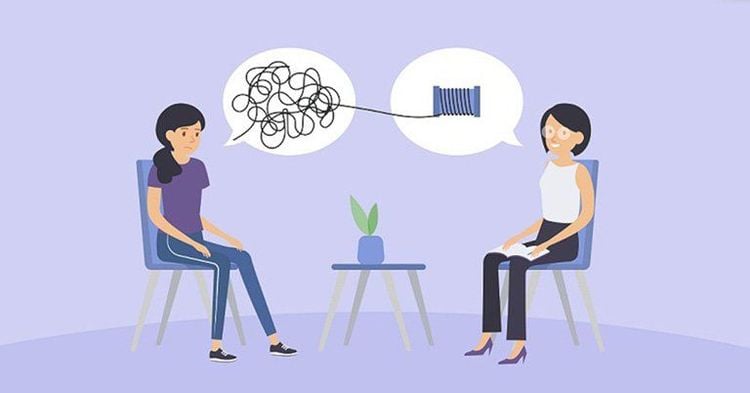
Mãn kinh nên làm gì khi thấy sức khỏe tinh thần không ổn thì bạn có thể gặp bác sĩ trị liệu
Hormone therapy Hormone replacement therapy (HRT) usually involves the addition of hormones such as estrogen or progesterone that decrease during menopause.
Estrogen can be prescribed in many forms, including pills, patches, or vaginal rings. Low-dose estrogen is usually administered intravaginally through the ring and can treat symptoms such as dryness, pain during sex, hot flashes, and night sweats.
If started within 10 years of the onset of menopause, hormone replacement therapy may protect against heart disease and ease menopausal symptoms. This is especially important if common symptoms like depression, bone loss, insomnia, and hot flashes are disrupting your quality of life.
Although potential risks including stroke, blood clots, gallstones and cancer make hormone replacement therapy controversial, evidence suggests it makes the most sense for those with early menopause abnormal.
Women under 60 years of age best identified to benefit from hormone replacement therapy with few risks. The type of hormone replacement and the length of treatment depend on many factors, such as your age, health history, symptoms, and the onset of menopause. Talk to your doctor if you have questions about this therapy.
Menopause is a natural transition in a woman's life. Although the end of menstruation is accompanied by some unpleasant symptoms such as hot flashes, night sweats, depression, and weak bones, adequate nutrition and physical activity can reduce the severity of menstrual cramps. these symptoms.
Eating enough protein and other whole foods like fruits, whole grains, vegetables and healthy fats is key. What's more, regular exercise supports your mood, bone health, and lean muscle mass. Be sure to talk to your doctor before making any major changes to your diet or exercise routine.
Please dial HOTLINE for more information or register for an appointment HERE. Download MyVinmec app to make appointments faster and to manage your bookings easily.
References: healthline.com, mayoclinic.org, webmd.com



